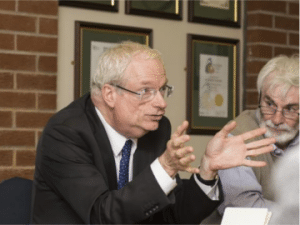The industry-backed Taskforce for Shale Gas has just published its first report. But as Ben Lucas, MA Investigative Journalist student at City University, finds, the reaction from local communities and industry shows it may have missed the mark.
This week, the Taskforce for Shale Gas published its first interim report, calling for a new single regulator for the UK’s inland oil and gas extraction sector.
The industry-backed body said that the current system is too fragmented. Currently, responsibilities are shared between the Environment Agency, the Department of Energy and Climate Change (DECC), the Health and Safety Executive, and local authorities.
The report recommends that the next elected government legislates the creation of a new, unified regulator for onshore underground energy as soon as possible.
The report comes at the same time as Lord Chris Smith (pictured), former head of the Environment Agency and chair of the Taskforce, warns that he is “hugely skeptical” of the prospects of fracking for shale oil in the UK.
Local Communities
The fracking-funded report largely focuses on the current system’s inability to address concerns and engage with local communities that might be affected by shale gas extraction.
It found that “the people who are concerned about the development of a shale gas industry believe that operators are disingenuous and that consultations are largely a tick-box exercise for a decision that had already been made.”
However, the reaction of those surveyed in the report suggests that its analysis might have missed the point.
Coverage by Drill or Drop, which followed up with local residents surveyed in Balcombe, claimed that residents were forced to look at ‘Nimby’ issues.
This, in turn, led to one of the report’s conclusions: that “lorry movements and the trucking in and out of drilling equipment, sand, pipes and other plan materials, are by far the greatest cause of concern in relation to the immediate environmental impact of a well site.”
However, local resident Charles Metcalfe disputed this conclusion, saying: “We are much more worried about water pollution and the danger to animal and human health of emissions.”
Mixed Reaction
Campaigners in Lancashire also had a mixed reaction to the report. The Blackpool Gazette heard from a spokesman for the Preston New Road Action Group. They said that the report had some merit but also missed the point.
“The report recognises the current inadequacy of well monitoring, but fails to address the issue of what happens in the long term,” the spokesperson said.
They continued: “Public opinion is growing against shale gas, but the only recommendation is to boost the industry’s public relations activity, rather than admit to the truth, that it never can be 100 per cent safe, however you redesign the regulatory system.”
Bob Dennett from Frack Free Lancashire did, however, acknowledge that “if fracking does go ahead we will need a strong independent regulator with real enforcement powers.”
Industry Reaction
While it may be assumed that the industry and its coordinating bodies would automatically support this report, some members of the industry were not fully convinced either.
Ken Cronin, chief executive of the industry representative body the UK Onshore Oil and Gas Group, welcomed the report, stating that “public confidence in our regulatory system is vital.”
And while a Cuadrilla spokesman told the Blackpool Gazette that the report makes a “useful contribution”, they believe that the announcement earlier this year by the British Geological Survey to independently monitor an increasing number of fracking sites is enough to provide assurance to people that shale gas exploration can be properly monitored.
The Onshore Energy Services Group, on the other hand, was extremely critical, stating: “It will be unnecessarily time-consuming and costly for the taxpayer, with no guarantee that it will do anything to improve public confidence.”
Photo: Shale Energy Insider via Creative Commons
Subscribe to our newsletter
Stay up to date with DeSmog news and alerts







